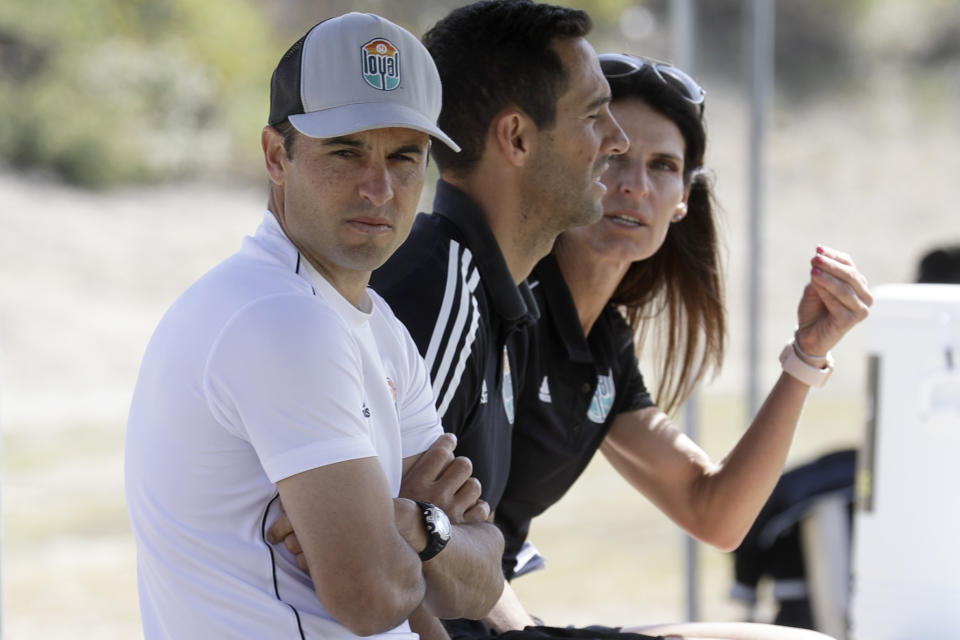Is minor league soccer right to return with fans this weekend? Landon Donovan is OK with it — for now
Major League Soccer and the National Women’s Soccer League are already playing games — minus three teams stricken by COVID-19 — in tightly controlled “bubbles” in Central Florida and Utah, respectively. The NBA has followed MLS to Orlando, where it will resume its 2019-20 season later this month. Major League Baseball will soon begin an abbreviated 60-game slate without fans in attendance. The Big Ten announced this week it would be playing a conference-only schedule amid the ongoing pandemic.
And then there’s the United Soccer League, the sprawling lower-league soccer system in the United States and Canada comprised of more than 125 clubs, from the second division down to the non-professional fourth tier. Not only will the USL Championship, which sits one rung below MLS, become the first American-based sports league to return in its own stadiums for kickoff this weekend, it’s actually going to do it with fans in attendance. Really.
Compared to other leagues’ approaches, the USL’s scheme seems unnecessarily cavalier. After all, the U.S. remains the epicenter of the coronavirus crisis, with cases, hospitalizations and deaths spiking in many of the states in which the 35 Championship division clubs operate. But to hear U.S. men’s national team legend and current San Diego Loyal co-owner, general manager and head coach Landon Donovan tell it, the decision to return to the field is not being taken lightly.
“All of our players wanted to play. We’re ecstatic to be back,” Donovan told Yahoo Sports on Friday, shortly before he and his team boarded a commercial flight to Salt Lake City, where the Loyal will take on Real Monarchs at Rio Tinto Stadium in front of up to 5,300 supporters. “But, I have to say, we are still in the middle of this pandemic. And we’re trying really hard to make sure that we don’t have any cases.”

So far, so good. San Diego has yet to have a player test positive for the coronavirus. They’ve been training for weeks. They bussed two hours north to Los Angeles last weekend for a friendly. But they also haven’t flown anywhere since the league shut down in mid-March. Understandably, there was some concern ahead of Friday’s trip.
“Getting on a plane is obviously where there’s a little hesitation, because you’re around other people,” Donovan said. “We will be uber-diligent. At some point, you can’t take all the risk out of it. If we are going to play, we’ve got to take educated risks and do our best to stay safe.”
Some would argue that the USL — which, unlike its major league brethren doesn’t rely on massive media rights deals to underwrite its operation — shouldn’t be attempting to play at all. That the league should just scrap the 2020 season altogether in light of the worsening situation in the U.S.
This was considered; only after a vote last week by the Championship’s board of governors were the plans to return a go. And overall, Donovan is comfortable with the safety protocols in place.
Over the last fews months, he’s tried to learn everything he can about the virus. He grilled a prominent epidemiologist personally. Armed with that knowledge, he believes the risks are reasonable.
After the trip to Utah, each of the Loyal’s remaining away games are against teams within driving distance. The fans in attendance at 20,000-seat Rio Tinto on Saturday will be required to spread out.
“From what I’ve read and seen, the chances of contracting the virus outdoors are very slim,” Donovan said. “So people socially distant in a stadium, outdoors — I don’t have any issue with that personally. It shouldn’t impact our players at all, because they won’t be near any of the fans.”
Donovan is not expecting fans to be allowed back for Loyal home games for the rest of the season. California Gov. Gavin Newsom has made it clear that’s not likely. As an owner, that means Donovan stands to lose money — the expansion side sold out its home opener before play stopped. But he’s OK with that, too.
“The debate with any professional sports organization right now is do you [absorb] the short-term losses so that your franchise is still relevant?” Donovan said. “If we disappear for the rest of the year, that’s really hard on our club. So for us, the equation was do we suffer some short-term losses but stay relevant and stay in front of people? The calculus on our side was yes, we do.”
Assuming it’s safe, that is. Or as safe as it can be.
“There’s still some anxiety around it,” Donovan admitted. “For me personally, I have three little kids and a wife. I’m not around my parents right now, I’m not around my in-laws or anybody high-risk. When I go out, I’m always wearing a mask. If my wife and I go out to eat, we sit outside. I don’t speak face-to-face to anybody. I stay away from everybody, especially indoors. Even outside of training, I’m not near any of the players. I don’t feel at risk in those situations. So we’re doing everything we can to be smart about it.
“But the fact that we get to go out and do what we love is really nice. Being inside for months at a time is also really unhealthy. I believe it was necessary, because you don’t want people dying. I also know some of our players struggled. It’s been really hard on not just professional athletes, but everybody. That’s why you try to make the best educated decisions you can to stay safe, but also to get some normalcy back in your life.”
More from Yahoo Sports:

 Yahoo Finance
Yahoo Finance 

